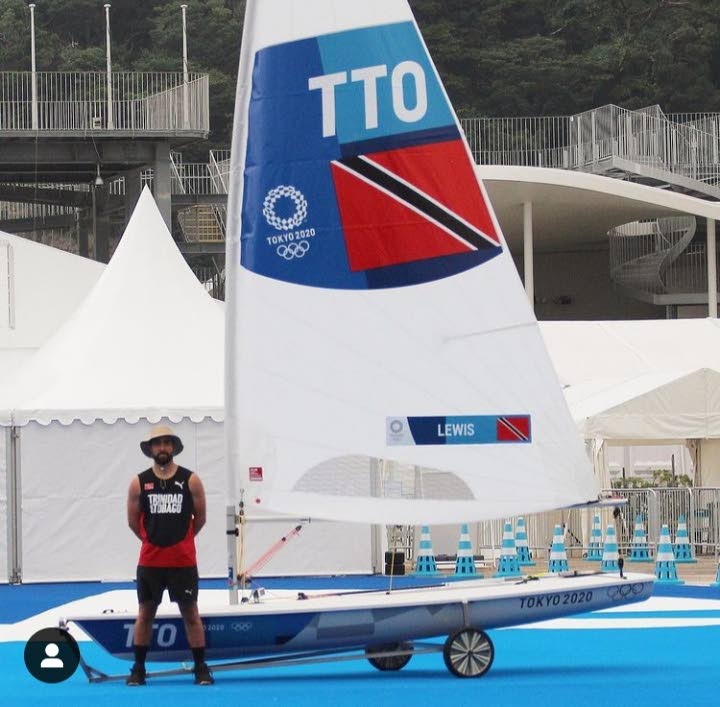MEMBERS of Trinidad and Tobago’s Olympic delegation have begun to arrive in Tokyo ahead of the July 23 to August 8 Games.
Sailor Andrew Lewis, his manager Kairon Serrette and physiotherapist Maytas Toth have already touched down in Enoshima Islands, Kanagawa, Japan.
Additionally, the TT Olympic Committee’s covid19 liaison officer Rheeza Grant, chief medical officer Dr Rudranath Ramsawak and Dr Nailah Adams (doctor) are expected to arrive on Thursday. Chef de mission Lovie Santana begins her trek to Tokyo on Saturday.
The sailing trio will be based in Kanagawa for the entire duration of the Games in a satellite village. This is a smaller version of the main Olympic Village set up in another location to host events there.
Sailing and cycling are the only two disciplines in which TT athletes will be housed at satellite villages.
TT’s cycling sprinters Nicholas Paul and Kwesi Browne will reside and train at the same satellite village while road cyclist Teniel Campbell will be placed in another location closer to where her event rides off.
Meanwhile, Grant, Ramsawak and Adams have been strategically deployed en route to Tokyo beforehand to arrive ahead of the majority of TT’s Olympic delegation. This was done to ensure all covid19 countermeasures were in place to welcome the travelling contingent.
The remainder of TT’s locally-based delegation, inclusive of track and field doctor Dr Anyl Gopeesingh, departs later this week.
During an online press briefing hosted by the TTOC on Wednesday, chef de mission Santana confirmed, “The completion of the Olympic delegation registration meeting was completed and that means that Tokyo is prepared to receive our delegation.”
Local Olympic committee president Brian Lewis was pleased to announce that a “significant percentage” of TT’s contingent had already fully vaccinated for covid19.
He also said that one member of the TT Olympic delegation was replaced after he/she returned a positive covid19 test before leaving Trinidad on Wednesday. Lewis said the person, who was a member of the medical team, will no longer travel with the team.
Before arriving in Tokyo, it is mandated that all delegation members must have in their possession two negative PCR tests taken 96 hours prior to touchdown.
In this regard, Lewis was pleased with the protocol put in place by the International Olympic Committee, Tokyo organising committee, Japan government and Tokyo metropolitan government.
“Unfortunately, that individual will not be able to travel and we have put in place the replacement. It highlights the rigorousness of the covid19 countermeasures put in place that the TTOC is adhering to,” he said.
Lewis, however, outlined a plethora of protocols that must be adhered to by all athletes/officials and staff to ensure their safety at the Games.
If a member encounters travel delays and will arrive in Tokyo beyond the mandatory 96-hour life of their PCR test results, they will be allowed to take another set of tests at another airport before entry into Tokyo. Upon arrival there, additional tests would be administered.
At the Olympic Village, there will be daily monitoring taking place between the chef de mission and covid19 liaison officer. Owing to IOC and Tokyo regulations, athletes will undergo daily antigen saliva testing within the village.
“It’s a collaborative effort with team managers and TTOC officials to adhere to regulations. Expect surprises. The opening phase of delegations arriving in Tokyo is very important.
“There a pledge you have to sign off to. Officials will also be checking the smartphones of delegation members to ensure they have the necessary apps downloaded to stay abreast with covid19 updates at the Games,” he added.
TT’s Olympic delegation has already been advised by Santana and Grant that the athletes have certain allowances subject to strict movement control and reporting control.
The athletes will not be able to mingle and they must train by themselves. There would be grab-and-go meals and limited movement. They are essentially confined to the bubble.
If an athlete returns a positive test, an isolation protocol comes into effect and the athlete will be separated from the delegation.
“There is a covid19 force that will then take control of the situation. The antigen test will then trigger a PCR test. Once that returns positive, the individual will be taken to an isolation facility for a number of days and monitored on a daily basis.
“The status of any individual who tests positive will be determined by the protocols put in place. It would determine when the athlete has to compete.
“If for some reason that should happen, I would imagine, if it’s close to the competition period, there is a real risk and possibility that the athlete will not be allowed to compete,” Lewis said.
Santana also interjected to say that if one of our athletes tests positive for coronavirus, they will not be considered as disqualified.
It would be considered as “Did Not Start” and some form of memorabilia would be given to them from the Games.
Lewis also said that the TTOC recently held two covid19 countermeasure webinars with members who were mandated to attend at least one.
He credited the delegation’s “overwhelming attendance” and was pleased that his organisation had been doing all it could to ensure all members were well informed of the strict regulations laid out by the Tokyo organising committee and its affiliates.
He added “Adhering to the covid19 countermeasures, as strict and restrictive as they are, is extremely important. Failure and breaches can result in Tokyo organising committee, International Olympic Committee, the Japan government and the Tokyo metropolitan government warning, suspending and the ultimate sanction is sending back home.”
Scource: https://newsday.co.tt

